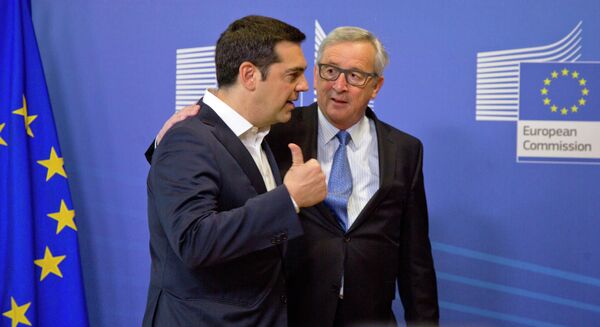In a mainstream media interview, Juncker claimed he stuck up for Greece against stiff opposition from German Finance Minister Wolfgang Schauble, who wished to see the country ejected from the euro.
"If the Commission had not ensured Greece wasn't expelled from the eurozone in 2015, the balance would be less good. I fought hard for the stability of the Eurogroup, in particular for Greece. If I hadn't done that, the eurozone would've decayed," the EU's effective chief executive said.
Juncker has repeatedly professed his affinity for the Greek nation — most recently in July, when he visited Aristotle University in Thessaloniki, Greece's second-largest city, to receive an honorary doctorate award.

In his acceptance speech, he claimed he had fallen in love with the nation, and paid tribute to "those Greeks nobody knows."
"The poorer part of the society, they are paying the price. Not the elites — the poorer part of this country are paying the price and in no other country would this have been possible," he said.
The citizens of whom Juncker spoke quickly flocked to the streets in response to this billet doux — namely, to form an "unwelcome committee" and protest furiously. Tensions reached such a degree authorities were compelled to call in riot police.
Their incendiary fury was perhaps understandable. Juncker's comments were certainly accurate (it is indeed average Greek citizens who have borne the brunt of the country's economic woes), but the president failed to acknowledge the source of Greece's ongoing economic crisis — crippling austerity policies imposed by the EU on the Mediterranean country, which he himself advocated and has fervently supported ever since their institution in 2010.
Seven years later, the grueling measures have saved Europe's political and financial elites, but failed to produce economic recovery at any level of Greek society — the country's output has declined by 25 percent, and almost 25 percent of the Greek workforce have been forced out of their jobs. While in 2017 the Greek economy has finally begun to grow anew, any gains made are automatically siphoned off to Brussels, and the International Monetary Fund, leaving great swaths of the population wanting.
Moreover, while Juncker may well have been frank in claiming he preserved Greece's eurozone status in negotiations, such a rescue ran contrary to the views of Greece's ruling Syriza party, and the Greek population.
In 2015, the country was again offered an iniquitous bailout deal — a package the government posed, and Greeks voted against by some margin in a national referendum.
With "Grexit" looming, and the prospect of other similarly austerity-addled eurozone nations likewise heading for the door, Juncker arguably did come to the rescue — of the single currency, and Brussels' pan-European integration project.
Whatever the truth of the matter, Greek citizens certainly have little to be grateful for. OECD data indicates Greece performs well in only a handful of measures of well-being relative to most other OECD countries.
@OECD Government at a Glance for #Greecehttps://t.co/2p7rLhf0Mm
— Sotiris Karagiannis (@skaragiannis) July 13, 2017
Download the PDF from this link:https://t.co/g7RqFYz2fh pic.twitter.com/zd5IwchkIK
For instance, the country ranks well below average in income and wealth, civic engagement, housing, environmental quality, subjective well-being, social connections, and jobs and earnings.
The average household net-adjusted disposable income per capita is US$18,100 per year, well under the OECD average of US$29,016.
Furthermore, only around 49 percent of 15-64s in Greece have a paid job, below the OECD average of 66 percent, and the lowest figure in the OECD. Some 58 percent of men are in paid work, compared with 41 percent of women.




